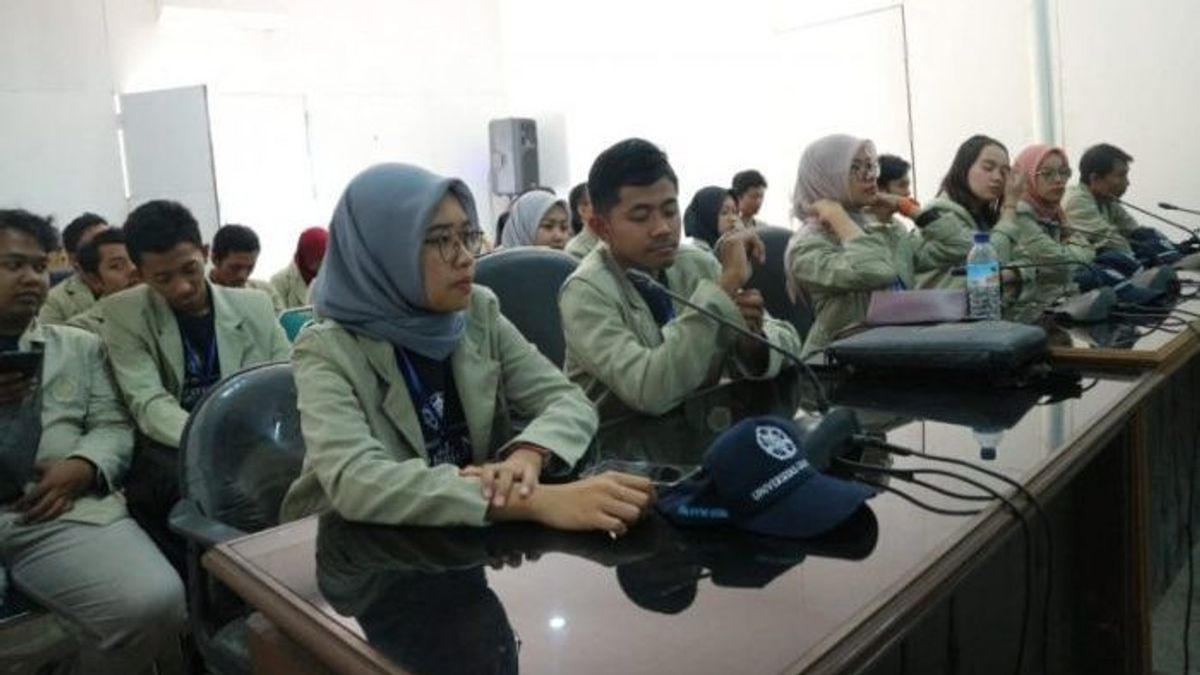
JAKARTA - President Joko Widodo's idea to encourage banks to be more open in providing credit or loan capital for students has resurfaced on social media. Some criticized the idea that Jokowi had put forward, which is actually one of the roots of the problem of youth poverty in the United States (US). So what are the benefits if applied in Indonesia?
One of the critics of the student loan idea is the Assistant Professor of Interfaith Education, Lailatul Fitriyah. He said, in the US, student loans are considered one of the scourges and roots of poverty for young people.
"In America, student loans are considered as one of the biggest scourges that become the structure and root of poverty for young people," Fitriyah said via Twitter.
Fitriyah said don't be tempted by the packaging of the financing loan program that seems to support this education. Because, "The Constitution itself is clear: Citizens have the right to [not buy] education."
According to him, whatever the scheme, debt is still debt. "The future financial burden that makes a person's future salary level not sufficient for himself and the people he has to bear."
According to Fitriyah, what should be encouraged are scholarships, not loan funds for education. "If you feel helped by a bank loan for college for various reasons, then what is at fault is a lack of accessibility to non-achievement forms of scholarship, not a lack of access to loans."
Based on Fitriyah's testimony, not a few of her friends in the US have become young professors, but they are not happy. "Why? Because their salaries have to pay off their education debt."
"Many people here in the US work decades after they graduate with great honors. But they can't afford a house, an apartment and can't even save money. Just because they still have to pay off debts from decades ago."
US student loan crisisIn America, student loans are considered as one of the biggest scourges that become the structure and root of poverty for young people. Do not be tempted by the appearance that seems to 'support education'. The Constitution itself is clear: Citizens have the right to receive (not buy) education. https://t.co/jME2iycvTq
— Prof. Laily Fitry (@MahameruLee) January 9, 2022
If you look at the data, the education debt crisis is indeed quite serious. According to a report by a think tank in Washington, the Bipartisan Policy Center (2021), student education debt has swelled by 144 percent since 2007. And there are about 45 million people in debt with a total education loan of US$1.7 trillion.
Zack Friedman, a financial planner cum author of The Lemonade Life in his writings for Forbes assesses the student loan crisis is worse than many people think. Why is that?
First, according to Friedman, there is an increase in access to credit for education debt. He calls this a double-edged sword. The reason is, along with easier access to student loans, more people will be able to access universities.
But at the same time the campus will also increase the cost of education due to increasing demand. This is what finally US students rarely think about, so they do not take into account the interest that continues to increase every year. And in the end, not a few are overwhelmed to pay student loan installments.
Then secondly, in the US the state support for higher education is not great. "State support for higher education has declined. With many states facing budget cuts and declining tax revenues, states have been unable to keep up with rising tuition, room and board costs at many public colleges and universities," Friedman wrote.
And third, student loans are not limited. Friedman said that even less bona fide universities still have access to disburse student loans. The problem is not only that it does not guarantee that students will get a high quality education.
"But if student borrowers from this school cannot repay the loan, then the federal government will pay the financial costs. For this the authors call for better institutional accountability."

From a historical perspective, the transformation of higher education follows the US political economy ideology which is considered to be moving towards neoliberalism since the regime of President Ronald Reagan in 1970. Neoliberalism here means, as explained by Ekiyama Bramantika and Nanang P Mugasejati in their thesis entitled "The Consequences of Neoliberalization of Higher Education". Education on Freedom: The Case of Student Loan Debt in US", higher education has shifted from a sector that is considered a public investment to a sector that is considered a private investment.
"The responsibility is left to the individual, not the state. President Reagan is the President who leads the process of neoliberalization of higher education in America, by encouraging states to participate in cutting subsidies for higher education in their respective states. At the same time Reagan also encouraged students to use debt as a way to finance their higher education."
This is what according to Ekiyama and Nanang (2017) has an impact on the increasing number and debt burden borne by each student, as well as the soaring cost of education. Student loan schemes are believed to open wider access to higher education in the US, and increase their individual freedom and social mobility. However, according to the analysis of Ekiyama et al, the opposite happened.
"Although the debt scheme initially opened wider access for individuals to enter the world of education, at the same time, the debt burden turned out to be in the end creating additional restrictions. And various side effects that ultimately prevented debt holders from actively participating in market activities, or hindered them from participating in market activities. to move more freely down the social ladder."
Back to Indonesia. President Joko Widodo has actually proposed the idea of student loans since 2018 when Jokowi asked banks to provide credit or loan models to underprivileged students.
"I want to give homework to ladies and gentlemen with what is called a student loan or education credit," he said when meeting with leaders of Indonesian commercial banks, at the State Palace, March 15, 2018, as quoted by Suara.com.
*Read other information about RESEARCH read another interesting article from Ramdan Febrian Arifin.
Other BERNASThe English, Chinese, Japanese, Arabic, and French versions are automatically generated by the AI. So there may still be inaccuracies in translating, please always see Indonesian as our main language. (system supported by DigitalSiber.id)







